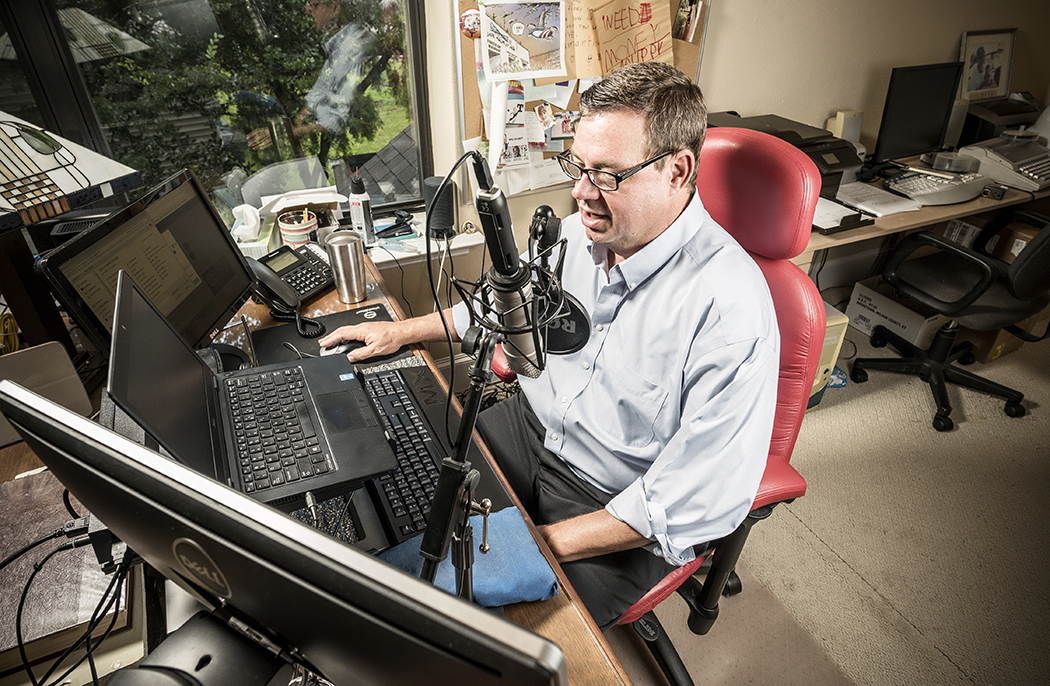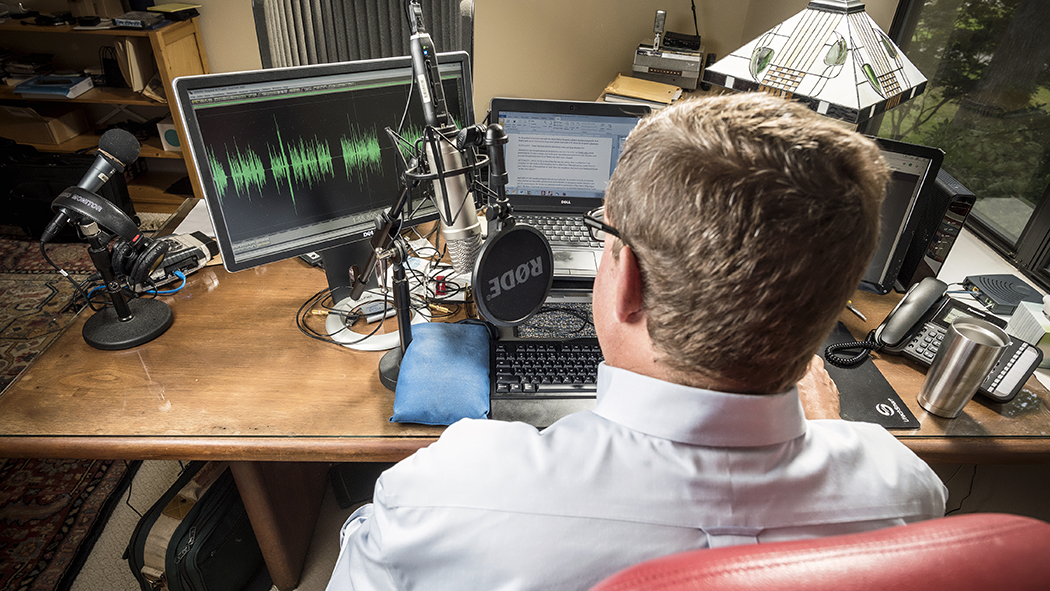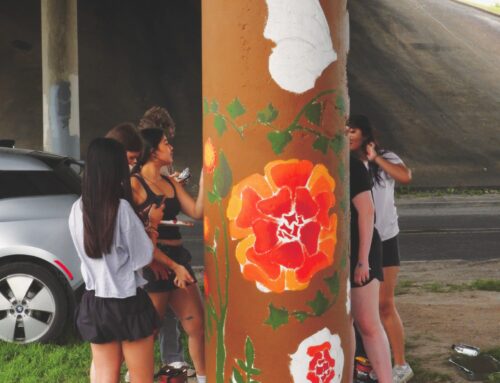
Wade Goodwyn writes, edits and records his NPR stories from his home studio in Forest Hills. (Photo by Danny Fulgencio)
“This is Wade Goodwyn for NPR,” booms the baritone voice weaving the news of the day into engaging stories on Morning Edition and All Things Considered.
A 2016 Adweek story detailed how fans on Twitter describe his voice.
“ ‘Texas timbre’ is what one person called it. ‘Nonplussed drawl’ wrote another. Still another opined: ‘His voice is like warm butter melting over barbecue’d sweet corn.’ ”
Goodwyn’s big break came in 1993 during the siege of the Branch Davidian complex near Waco, Texas. It was a viral story before there was such a thing. After an attempt at a raid by the ATF, many of the members of the religious sect barricaded themselves inside their complex with weapons while federal agents surrounded the buildings.
It was the biggest story in the country, and Goodwyn was in the thick of it. Then a freelance reporter for National Public Radio, he sat in media briefings each day with reporters from the New York Times and Washington Post, trying to glean as much as he could from the more experienced journalists.
The media was denied access to the Davidians, meaning the reporters had to trust what the FBI was telling them about the situation – until Goodwyn caught a break.
Some of the Davidians had been released during the holdout, and Goodwyn heard that they were being housed in the YWCA in Waco. He was able to get the number to the hall phone and called, hoping for the best. Someone picked up and he asked for Rita Riddle, one of the women released from the compound.
Sure enough, Riddle came to the phone, and all of a sudden, Goodwyn was talking with a real live Branch Davidian. “I had gotten something no one else had,” he says.
Later, he would go on to speak with some of the mental health professionals who were working with the children who had been removed from the compound. The children colored pictures of their compound on fire and told the adults that their parents were dead.
After 51 days, the compound caught fire as the FBI inserted tear gas into the building, and 76 people died inside.
Goodwyn’s reporting launched him from freelance reporter to being on staff as a national correspondent at NPR, but he hadn’t always been a journalist. After abandoning a theater major at the University of Texas and switching to history, he worked in politics on campaigns for Texas Congressman Lloyd Doggett and later Ralph Nader, and then became an organizer in New York.
He worked with a group of 50-60 multi-ethnic interdenominational churches to help them advocate for better municipal services and improved living conditions. “I helped them learn how to use the power of the collective churches to hold the politicians accountable,” he says. “To push back against organized money.”
He lived in New York for seven years, but eventually wanted a new challenge. In 1991, he finagled his way into a meeting with Robert Siegel, who hosted NPR’s “All Things Considered” for over 30 years, and Siegel connected him with the NPR office. “This is Wade Goodwyn, and he is interested in a job here,” he said.
NPR said yes, and that was that. Goodwyn, with no prior experience in journalism, was a reporter. “I knew I was never going to survive freelancing in New York City, so I moved back to Austin,” Goodwyn says.
Goodwyn didn’t know how to edit and produce radio stories, but his background in politics helped him understand how the world worked. He could see relationships, imbalances, and dynamics in society that made for great storytelling on important issues. “If you understand how power works, you understand a lot,” he says.
He was slow at first, but persevered and learned the skillset. “It took me a year and a half to figure out what I was doing,” he says.
His first published story in 1991 was about Houston housing project residents who were refusing to move out after the government decided the land was too valuable for federal housing. Goodwyn’s familiar timbre has been on the airwaves ever since, producing stories in and around Texas as a national correspondent for NPR.
Over the years, he has covered too many mass shootings, the Oklahoma City bombing and numerous hurricane recoveries. He has been traveling monthly to MD Anderson in Houston for treatment of melanoma, but he still works regularly in his home studio in Forest Hills, where he lives with his wife and two teenage daughters.
The news business and NPR have changed a great deal since Goodwyn started. From an upstart news organization doing it’s best to stretch resources and cover what it could, NPR is now one of the most comprehensive and well-trusted news sources, according to Business Insider.
His voice can also be heard on PBS documentaries and a radio program for the Dallas Symphony Orchestra (his “Jaap van Zweden” is impressive).
In an age when media has to fight to be trusted more than ever, Goodwyn is still focused on reporting news that matters. “If something is amiss, there are opportunities for your nose to work,” he says. “If there is something off, it makes you go check it out.”

Goodwyn has covered school shootings, hurricanes and the Waco siege in his years with NPR. (Photo by Danny Fulgencio)





